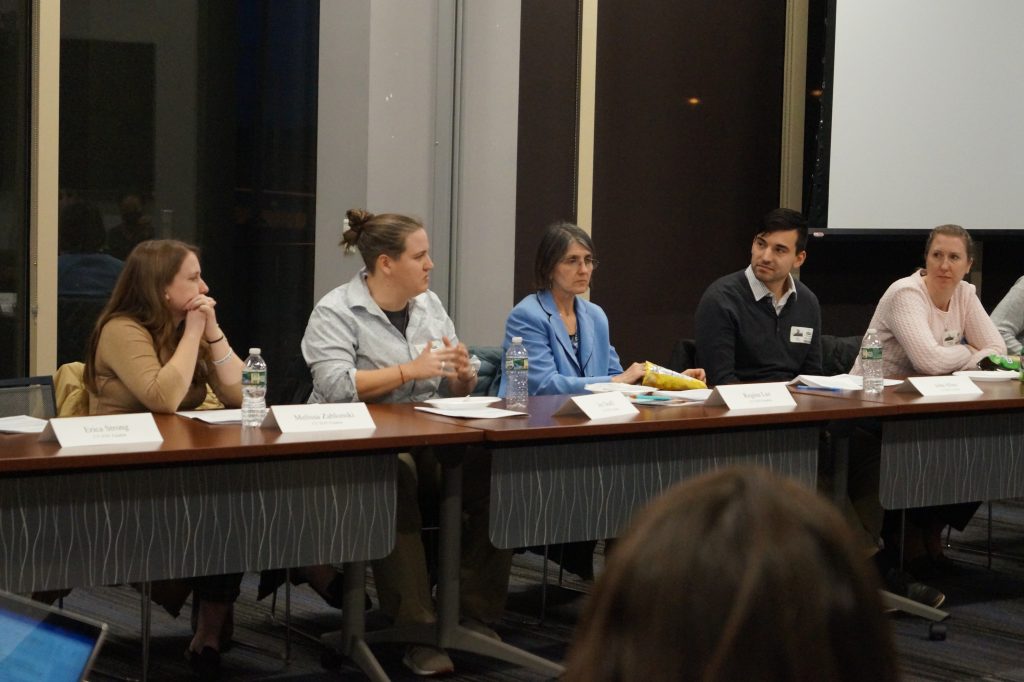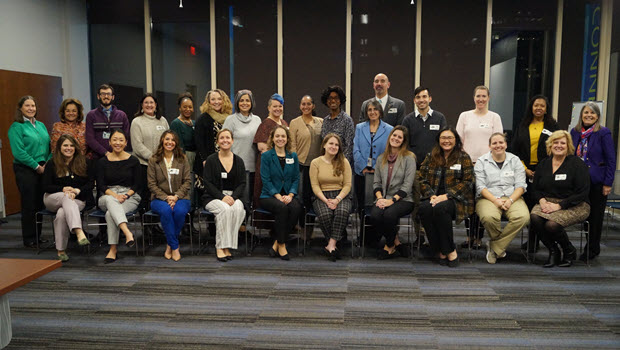In the midst of our current teacher shortage the question of how to better recruit, hire, and retain educators is the topic of many conversations around the state. Teachers are in the best position to answer that question, and yesterday they had an opportunity to share their answers with Commissioner of Education Charlene Russell-Tucker and staff at the State Department of Education during an educator roundtable made up of recent state teachers of the year and finalists.
Removing financial barriers to becoming a teacher, reducing stress, and increasing pay were some of the responses widely agreed upon by participants.
Meriden teacher Jen Duell, a 2022 State Teacher of the Year finalist, said she and her wife have both been in the teaching profession for many years—yet half their combined income is going to cover the cost of childcare for their two young children.
“My wife started her professional life as an environmental engineer, and if she becomes a school administrator, she will be making as much as she was 18 years ago in her first career,” Duell said. “We’re seriously debating walking away from jobs we love to have a salary that pays for more than just childcare.”
Retired Bridgeport teacher and 2019 State Teacher of the Year Sheena Graham said that, while teachers in general are not paid enough, the problem is especially severe in underresourced towns and cities. She watched many teachers leave jobs they loved in her district to make $15,000 or $20,000 more in other Fairfield County towns.
The educators agreed low salaries are a big hurdle when it comes to attracting the next generation of teachers. A high school teacher said that she teaches juniors and seniors who are watching their own parents struggle to make ends meet, and their number one concern in choosing a career is salary. They do not see teaching as a viable path given the low pay.
Newington teacher and 2023 finalist Jennifer Rodriguez said that students like her who are the first in their families to go to college and may have to take on substantial student debt are especially ill prepared to clear the financial barriers to becoming a teacher—which include unpaid student teaching requirements and the costs associated with required tests and certification.

Meriden teacher Jen Duell, a 2022 State Teacher of the Year finalist, shared that she and her wife have contemplated leaving their teaching jobs that they love in order to earn higher salaries.
“Those financial barriers especially hurt aspiring teachers of color, yet what they bring to the table is so worthwhile for our students,” Rodriguez said.
When it comes to attracting and retaining more teachers of color Windsor teacher Rochelle Brown, the state’s 2021 Teacher of the Year, said low pay isn’t the only concern. “We need support for teachers of color once they get into the classroom,” she said.
Brown was the only Black teacher in her school when she started teaching, and says, while her experience as the only Black student in many of her classes growing up prepared her in some ways, she knows many other educators of color wouldn’t have remained in the profession without that crucial support of colleagues with whom to share experiences.
“One thing Connecticut is doing really well, for social studies at least, is diversifying the curriculum,” said Putnam teacher Melissa Zablonski, a 2022 finalist, who is teaching the state’s new Black and Latino studies course. “The Black and Latino students feel so seen and heard with this new class. What kid is going to want to be a teacher if they go through the whole k-12 curriculum and don’t see themselves in that curriculum?”
Simsbury teacher and 2023 finalist Lisa Abel says that despite the downsides to the profession, she would never trade in her career, and she wants her students who are considering becoming teachers to know that.
“At the end of the day, I know I made a difference, and my life has meaning beyond just working in an office all day. Maybe students see us stressed out and don’t see how much the profession means to us,” Abel said. “Nurses and doctors would say the same thing. In the end, all of these things we’re discussing are important, but the biggest seller is how we talk about what we do.”
She added that teachers need to do more to get the word out about the work they—to both inspire the next generation of educators and raise the profile of the profession. “I like some of the campaigns currently happening, like CEA’s Because of a Teacher campaign. The more we can get the word out about what we do, the better.”
Newington teacher Elsa Batista, a 2021 semifinalist, added, “It’s important to get our stories out there because we do so many wonderful things in the classroom, yet some don’t see us in a professional light.”
Teachers agreed on the need to focus additional resources on students’ mental health and social and emotional learning, saying the anxiety some students feel in school and the trauma some families have experienced from the education system are barriers to growing the next generation of educators.
“Rochelle and I had a conversation with Senator Murphy a few years ago about how in schools there’s a big push currently for social emotional learning, yet standardized testing is how we measure success. These two things totally contradict each other,” said Region 16’s Meghan Hatch-Geary, the 2020 State Teacher of the Year. “We are saying and purporting to believe one thing and contradicting ourselves on the other end.”
Rodriguez said that, in an effort to make up for pandemic learning loss and track how students are progressing, at one point she was required to assess her first graders every other month of the school year. “That’s not giving me time to teach because I’m assessing all the time, and I’m stressing out these very young children in the meantime.”
CEA President Kate Dias told the roundtable participants that it’s so important that all teachers continue to tell their stories.
“We’re trying to make sure your presence is felt on a daily basis among decisionmakers—you can’t do that because you’re in the classroom. We’re pushing really hard because we think we have an opportunity this legislative session. Every story you tell to a person who is a decisionmaker is making a difference. Keep that pressure on our lawmakers. We need big bold statements right now, not little nudges.”
She continued, “If you haven’t met your local legislators, do. If one of them is Tammy Nuccio, she’s trying to repeal your 30-minute lunch.”
The State Department of Education staff thanked teachers for their time and for sharing what they’re seeing every day in their schools and classrooms.
“We appreciate hearing from you because it really helps us to think about the work we do on a day-to-day basis,” said Chief Talent Officer Shuana Tucker. “You and your feedback really help guide us and what we do and make us better.”







